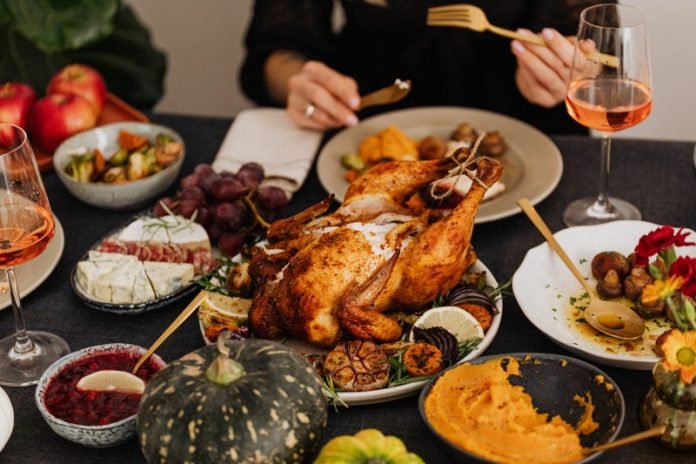
Digestive disease experts note that the time between Thanksgiving and New Year’s Day is one of the riskiest for getting food poisoning, which can lead to chronic illness in some people.
“The common bacteria – and it’s usually bacteria – that cause food poisoning are E. coli, Campylobacter, Shigella and Salmonella.
You’ve probably heard their names, but they are not the guests you want at your party,” said gastroenterologist Mark Pimentel, MD, executive director of the Medically Associated Science and Technology (MAST) Program at Cedars-Sinai.
Each year 48 million people in the United States get sick from foodborne illness according to estimates by the Centers for Disease Control and Prevention. Researchers have identified more than 250 diseases that come from contaminated food.
There’s plenty to eat almost everywhere you go during the holidays. Cooked meats, bright green salads, cookie dough and delicious desserts made with raw eggs.
But how well we cook that turkey or ham, and whether we wash the greens thoroughly or buy pasteurized eggs, can make the meal delightful or a disaster.
A meat thermometer and soap and water are essential tools for a successful holiday meal.
“Campylobacter grows on meat and it can easily get in your body and cause infection. But that won’t be a problem if the food is cooked completely; for poultry,165°is key. Bacteria can grow rapidly in the danger zone between 40° and 140°,” said Pimentel.
Once the food is cooked, it is still important to be vigilant.
“After everyone has enjoyed the holiday meal, don’t leave prepared foods out longer than two hours; put them in the refrigerator.
But keep in mind that if you reheat and cool them over and over, that can create an environment ripe for the growth of bacteria,” warned Pimentel.
And when it comes to leftovers? They’re safe to eat for three to four days, according to the CDC.
Vegans and vegetarians are not immune from the risk of contracting a foodborne illness.
According to the U.S. Food & Drug Administration, there have been outbreaks of E. coli and Salmonella this year involving onions, spinach, some packaged salad greens and seafood.
Food Poisoning and IBS
The most common symptoms of food poisoning are an upset stomach, nausea, stomach cramps, vomiting, diarrhea and sometimes a fever.
It can take three to seven days to feel completely well, but Pimentel emphasized there are times when it is important to get medical treatment.
“As soon as you can’t hydrate yourself, or you’re losing more water than you can put in, then you’re in trouble.
Or if a fever is high and it’s lasting for more than just a couple of hours, you need to seek help because it might take antibiotics to help you fully recover,” he said.
Pimentel knows well how food poisoning can sometimes lead to chronic, serious illness.
A specialist in motility disorders of the gastrointestinal system, Pimentel and his team at Cedars-Sinai pioneered a new approach to the diagnosis and treatment of irritable bowel syndrome (IBS) by identifying foodborne illness as a trigger for developing the disease.
“About 10% of the people who get food poisoning develop IBS, a disorder that disrupts the GI system when bacteria, like Salmonella, produce certain toxins.
Patients experience chronic bouts of diarrhea, constipation, gas, and severe bloating.
The good news is we now have a reliable test for irritable bowel syndrome and effective antibiotic treatments to help many patients finally get relief,” said Pimentel.
Food Safety Advice for Those with Chronic Illness
If you live with a chronic digestive disorder, such as IBS or inflammatory bowel disease (IBD) – Crohn’s or ulcerative colitis – holiday celebrations organized around festive foods can be particularly stressful.
“People often modify their diets to help reduce symptoms and control their disease. But when celebrating holidays and gathering with friends and family, it’s harder to know what you’re eating and how – or if – it will affect your symptoms.
This can really increase food-related anxiety,” said Kelly Issokson, MS, RD, a registered dietitian with the Cedars-Sinai Nutrition and Integrative IBD Program.
Patients who have weakened immune systems, or are taking immune suppressing drugs, need to be extra cautious because they are more susceptible to food poisoning, according to Issokson.
“Take proper precautions when purchasing, transporting, storing, preparing, cooking and eating foods. Wash your hands during all stages of the process.
Keep food storage and prep areas clean and prevent cross contamination by using separate cutting boards and utensils for raw and ready-to-eat foods.”
Issokson also recommended that people with IBS or IBD call ahead to find out what is going to be served to see if there are foods they can eat or if they should bring something to eat that won’t trigger symptoms.
Also, patients should consider having any regular medications on hand that are prescribed for their digestive disease.
Talking a walk before or after the holiday meal – or doing some deep breathing – can also help calm the anxiety that may come up at food-centered events, suggested Issokson.
It’s a way to help focus on the benefits that can come with celebrating the holidays with family and friends.
“In the most basic sense, we eat to survive. But as part of the human experience, eating is one of the ways we connect with people, celebrate, experience different cultures, and show our love for each other,” said Issokson.



